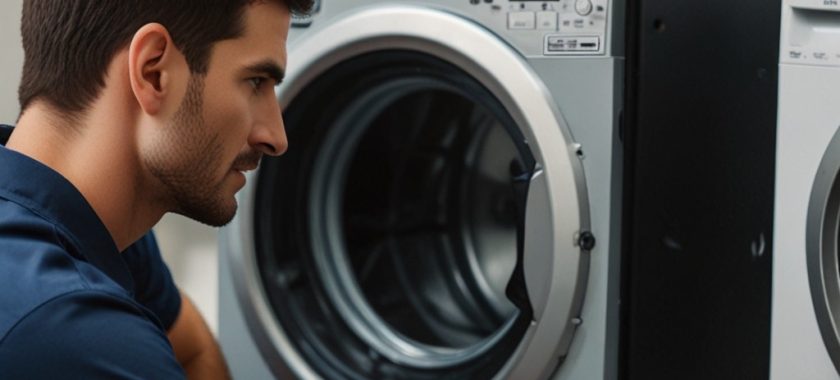Washing machines have become an essential part of our daily lives, ensuring convenience and efficiency in handling household chores. However, like all appliances, they are subject to wear and tear. One of the most common and potentially damaging issues is a leaky water hose. A leaking hose in your washing machine might seem like a minor inconvenience, but it can lead to more severe damage if not addressed promptly.
What Causes Leaky Water Hoses?
Washing machine water hoses connect the appliance to your home’s water supply and are responsible for delivering water to the machine. Over time, these hoses can develop leaks due to various reasons, some of the most common being:
- Aging and Wear: Rubber hoses can degrade over time. After years of use, they may dry out, crack, or become brittle, which eventually leads to leaks.
⠀
- Loose Connections: If the connection between the hose and the machine or the water supply becomes loose, it can result in water seeping through.
⠀
- Kinks in the Hose: A bent or kinked hose can restrict water flow and cause unnecessary pressure build-up. Over time, this can damage the hose and lead to leaks.
⠀
- Corrosion: Metal connections on the hoses can corrode over time, particularly in areas with hard water. Corrosion weakens the integrity of the hose connection and can result in leaks.
⠀
- Physical Damage: Hoses can get accidentally pinched or punctured by sharp objects, particularly during the installation process or if the machine is moved. Even small cuts or punctures can lead to noticeable leaks.
⠀
The Dangers of Ignoring a Leaky Hose
⠀
At first glance, a small leak may seem like an annoyance rather than a serious problem. However, even minor leaks can have significant consequences if left unaddressed.
⠀
– Water Damage to Floors and Walls: Water leaking from your washing machine hose can seep into your floors, walls, and nearby cabinets, causing water damage. Over time, this can weaken the structural integrity of your home, leading to costly repairs.
⠀
– Mold and Mildew Growth: Excess moisture is a breeding ground for mold and mildew. Not only can this ruin your walls and floors, but mold can also pose serious health risks, especially to individuals with respiratory issues.
⠀
– Higher Utility Bills: A leaking hose can cause the washing machine to draw more water than necessary, leading to increased water consumption and higher utility bills.
⠀
– Risk of Electrical Short Circuits: In some cases, a leaking hose could cause water to pool near the electrical components of your washing machine, which can lead to electrical short circuits and even pose a fire hazard.
⠀
Signs You Have a Leaky Hose
⠀
Recognizing the signs of a leaky hose early on can save you from bigger issues down the line. Here are a few signs that you might have a leaky water hose in your washing machine:
⠀
- Puddles of Water Around the Machine: If you notice water pooling around your washing machine, particularly after a cycle, it’s a clear indicator that something isn’t right.
⠀
- Water Stains: Look for discoloration on the wall or floor near the washing machine. This could indicate a slow but continuous leak.
⠀
- Unexplained Musty Odor: A musty smell in your laundry area could indicate mold or mildew caused by excess moisture from a leaking hose.
⠀
- Low Water Pressure: If your washing machine takes longer to fill than usual or if you notice reduced water flow, a damaged hose might be partially obstructing water flow.
⠀
Preventing Hose Leaks
⠀
Preventive maintenance is always better than emergency repairs. Here are a few steps you can take to prevent leaky hoses:
⠀
– Replace Hoses Every 3-5 Years: Rubber hoses degrade over time, even without visible damage. Replacing them regularly can prevent future leaks.
⠀
– Use Steel-Braided Hoses: Steel-braided hoses are more durable and resistant to wear than traditional rubber hoses. They are an excellent upgrade for better long-term performance.
⠀
– Inspect Hoses Regularly: Make it a habit to check the hoses behind your washing machine every few months. Look for any signs of cracking, bulging, or corrosion.
⠀
– Ensure Proper Installation: Make sure the hose connections are tight, but not over-tightened, as this can lead to damage.
What to Do If You Have a Leaky Hose
⠀
If you discover a leak, it’s important to act quickly. Here’s what you should do:
⠀
- Turn Off the Water Supply: Immediately shut off the water supply to the washing machine to prevent further leakage.
⠀
- Unplug the Machine: For safety, unplug your washing machine to avoid any electrical issues caused by the leak.
⠀
- Inspect the Hose: Look for visible signs of damage, such as cracks, bulges, or corrosion at the hose connections.
⠀
- Call a Professional: While replacing a hose might seem like a DIY task, it’s always best to have a professional assess the situation. A licensed technician can identify the root cause and ensure that no other components of your washing machine are damaged.
⠀
Why Call Chula Vista Appliance Repair Company?
⠀
Leaky water hoses may seem like a small issue, but they can lead to significant damage if not handled promptly and correctly. At Chula Vista Appliance Repair Company, we specialize in identifying and fixing washing machine issues efficiently and effectively. Our trained technicians will not only replace the faulty hose but also conduct a thorough inspection to ensure your washing machine is in perfect working condition.
⠀
Don’t wait until a minor leak becomes a major problem! Contact Chula Vista Appliance Repair Company today and let our professionals handle it for you.
⠀
Contact us
(619) 880-5508


